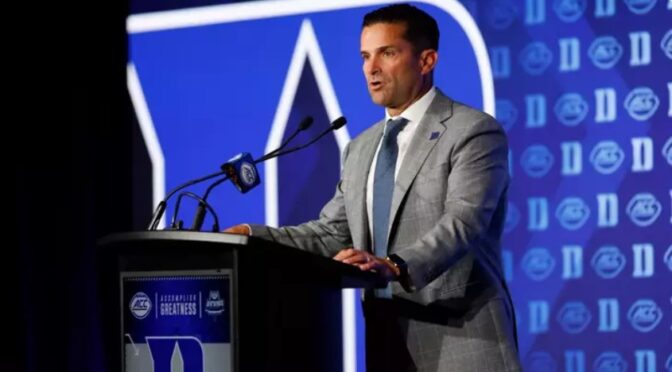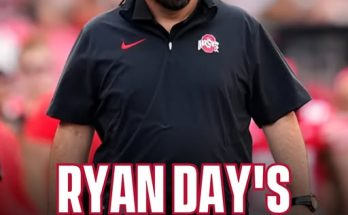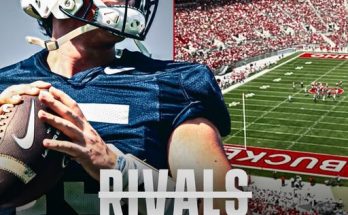The Duke Blue Devils football program has long been searching for the perfect combination of speed, strength, and discipline to elevate their standing in the competitive world of college football. Head coach Manny Diaz, known for his defensive expertise and high-energy coaching style, recently made a bold statement that has caught the attention of both fans and analysts. Diaz declared that this year’s Duke team is not only one of the strongest in the program’s history but also the fastest, a claim that speaks volumes about the team’s progress and potential for the upcoming season. With Diaz at the helm, the Blue Devils are embracing a new era, one defined by athleticism, mental toughness, and an unwavering belief in their ability to compete at the highest level. This bold proclamation is not just empty talk; it is backed by months of hard work, a culture shift, and strategic recruiting that has allowed Duke to close the gap with some of the powerhouses in college football.
The transformation of Duke football has been a gradual process, but Diaz’s influence has been apparent since the moment he stepped onto campus. He inherited a program that had shown flashes of promise but lacked consistency and depth, particularly when it came to competing with the elite teams in the ACC. Understanding this challenge, Diaz implemented a philosophy built on speed and strength, prioritizing not just talent acquisition but also player development. He knew that in order for Duke to compete, the team needed to become faster across all positions, more physical at the line of scrimmage, and sharper in their execution of game plans. By focusing on these fundamental elements, Diaz has engineered a roster that is not only versatile but also resilient, capable of going toe-to-toe with opponents that previously seemed insurmountable.
One of the key factors behind Diaz’s confidence is the team’s offseason conditioning program. The Blue Devils have invested heavily in strength and conditioning, employing cutting-edge techniques and technology to enhance player performance. From personalized nutrition plans to state-of-the-art weight training regimens, Diaz and his staff have ensured that each player maximizes their physical potential. Reports from within the program suggest that players have shattered previous weight room records and posted faster times in speed drills, reflecting the tangible results of their hard work. The emphasis on speed is particularly evident in the skill positions, where wide receivers, running backs, and defensive backs have all shown marked improvements in agility and acceleration. This newfound explosiveness could prove to be a game-changer when facing teams with traditionally faster rosters.
Another dimension of Diaz’s statement lies in the recruitment of players who fit his system. Instead of simply chasing stars in recruiting rankings, Diaz and his coaching staff have targeted athletes who combine raw speed with coachability and a strong work ethic. This approach has paid off, as several of Duke’s recent recruits have already made an impact during spring practices and offseason workouts. These young players bring not only athleticism but also a hunger to prove themselves, creating a competitive environment that pushes veterans and newcomers alike to elevate their game. Diaz has made it clear that no starting position is guaranteed, and this merit-based culture has fostered a sense of accountability and drive among the players.
In addition to physical attributes, Diaz has emphasized the importance of mental toughness and football IQ. A team can be strong and fast, but without discipline and smart decision-making, those qualities often go to waste. Diaz’s defensive background, which includes successful stints at programs like Miami, has taught him the value of preparation and situational awareness. He has instilled these principles into his Duke squad, ensuring that they not only outmatch opponents physically but also outthink them on the field. Film study sessions, situational drills, and simulated high-pressure scenarios have become a staple of Duke’s training regimen, equipping players with the tools they need to remain calm and execute under pressure.
As the new season approaches, expectations are rising among the Blue Devils’ faithful. Diaz’s comments about the team’s strength and speed have fueled optimism that Duke could make significant strides in the ACC standings. While the program has historically been overshadowed by conference giants like Clemson and Florida State, there is a growing belief that this year’s team has the potential to disrupt the hierarchy. Diaz himself has never shied away from lofty goals, often stating that he expects his team to not just compete but to win. His confidence is contagious, and the players have responded by embracing a mindset centered on proving doubters wrong.
The leadership within the team has also played a crucial role in this transformation. Veteran players have taken ownership of the locker room, setting examples for younger teammates and reinforcing the culture Diaz is building. Leaders on both offense and defense have stepped up, guiding their peers through the grueling demands of offseason training while maintaining a positive and focused environment. The bond within the team is stronger than ever, with players buying into the collective vision of achieving something special this season. This unity, coupled with the physical and mental growth of the roster, makes Duke a dangerous opponent for any team that underestimates them.
It’s important to note that while Diaz’s declaration has stirred excitement, it also raises expectations. Opponents will be gunning for Duke, eager to test whether the hype surrounding the program is justified. Diaz is well aware of this and has made it clear that words alone do not win games. The true measure of the team’s progress will be seen on the field, where speed, strength, and preparation must all come together to produce results. Nevertheless, the early signs suggest that this team is ready to rise to the challenge. Scrimmages and preseason practices have showcased a level of intensity and precision that was previously lacking, giving fans a glimpse of what could be a breakout year for the Blue Devils.
The offensive side of the ball has particularly benefited from the emphasis on speed. Duke’s wide receivers are quicker off the line, their route running has improved, and they have developed a greater ability to create separation from defenders. The running backs, too, have become more explosive, capable of turning small gaps into big gains. With a more dynamic offensive attack, Duke’s quarterbacks have more options and can stretch the field in ways that were difficult in previous seasons. This increased versatility makes it harder for opposing defenses to predict and contain Duke’s game plan.
Defensively, Diaz’s imprint is unmistakable. Known for his aggressive schemes and innovative play-calling, Diaz has crafted a defense that thrives on speed and pressure. The defensive line is not only stronger but also quicker, allowing them to disrupt plays in the backfield with greater frequency. Linebackers have shown improved lateral movement and coverage skills, while the secondary has benefited from enhanced speed, enabling them to keep pace with high-powered passing offenses. Diaz’s defensive philosophy is built on creating chaos for opposing quarterbacks, and with the tools at his disposal this season, Duke’s defense could emerge as one of the more formidable units in the ACC.
The special teams unit, often an overlooked aspect of the game, has also seen improvements. Faster coverage teams, stronger legs in the kicking game, and better overall coordination could give Duke a crucial edge in tight contests. Special teams often serve as the difference between winning and losing close games, and Diaz has made sure that this area of the roster receives the same attention to detail as offense and defense.
Looking ahead, the upcoming schedule will serve as a true litmus test for Diaz’s claims. Duke will face several tough opponents, each presenting unique challenges that will test the team’s speed, strength, and resilience. Early matchups against conference rivals will be especially critical, as they could set the tone for the rest of the season. A strong start would not only validate Diaz’s confidence but also build momentum and belief within the locker room. Conversely, setbacks could serve as valuable learning experiences, highlighting areas where further improvement is needed.
Ultimately, Diaz’s declaration about having the strongest and fastest team in years is more than just a motivational soundbite. It reflects a deeper truth about the state of the Duke football program—a truth rooted in hard work, careful planning, and a renewed commitment to excellence. The Blue Devils are not content with simply being competitive; they are striving to become a force to be reckoned with, capable of challenging for conference titles and beyond. While only time will tell if this vision becomes reality, there is no denying that the pieces are falling into place.
The players themselves have embraced Diaz’s message, with many publicly expressing their belief in the team’s potential. They know that success will not come easy, but they are prepared to put in the effort required to achieve it. This collective buy-in is perhaps the most important factor of all, as it creates an environment where everyone is pushing in the same direction. Whether it’s in the weight room, on the practice field, or during game day, the Blue Devils are united by a shared determination to make this season one to remember.
In the end, Diaz’s confidence is not just about this year’s roster; it’s about building a foundation for sustained success. By instilling a culture of speed, strength, and intelligence, he is setting the stage for Duke to not only compete now but also to thrive in the years to come. For fans, alumni, and players alike, the future has never looked brighter. If Diaz’s words hold true, and this truly is the strongest and fastest Duke football team in recent memory, then the rest of the ACC—and perhaps the nation—had better take notice.



